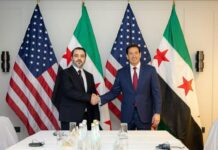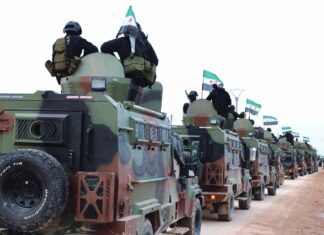
The Syrian government has condemned Israeli airstrikes and what it calls attempts to incite sectarian strife, as officials announced the full restoration of state control in the embattled Ashrafieh Sahnaya region, following days of violent clashes with armed factions.
The violence, which erupted after the spread of a provocative audio clip insulting the Prophet Muhammad, led to the deaths of at least 29 people, including 16 members of the General Security Administration (GSA). Syrian officials said the recording was deliberately circulated to provoke unrest, with a Ministry of Interior source confirming that efforts are underway to identify its true author.
In a statement issued on April 30, the Syrian government rejected all foreign intervention, emphasizing that “any weapon outside the state’s authority is illegitimate.” The statement criticized a minority of militants who refused previous integration offers from the Ministry of Defense and accused them of aligning with Israeli forces. “Israeli air cover will not protect militias rebelling against the state,” it said, warning that sectarian manipulation is part of a broader project to fragment Syria.
Israel’s ‘Unjustified Aggression’
Tensions in the Damascus countryside intensified after Israeli drones conducted multiple raids near Ashrafieh Sahnaya, killing at least one Syrian security officer and wounding others. The Ministry of Interior confirmed civilian injuries as a result of these attacks. Damascus Countryside Governor Amer Al-Sheikh stated that Israel’s actions have only deepened the crisis, calling the strikes “an unjustified aggression” on Syrian soil.
“We affirm that we stand equally with all Syrians, and everyone is equal before the law in rights and responsibilities,” Sheikh said after visiting the area with officials from Suwayda and Quneitra. He underscored the government’s zero-tolerance policy for attacks on religious sanctities, adding that “weapons must be in the hands of the state alone to maintain civil peace.”
Unity Remains Paramount
Despite the escalation, Syria has pursued reconciliation and unity. The General Security Administration (GSA) reported that most Druze factions and local leaders continue to cooperate with the government. Lieutenant Colonel Hussam al-Tahhan, head of Damascus Countryside Security, confirmed that security forces had entered all neighborhoods in Ashrafieh Sahnaya and had begun working with local dignitaries to stabilize the area and arrest remaining militants.
Sheikh Suleiman Abdul Baqi, leader of the Druze Free Jabal al-Arab Gathering, blamed “extremist elements” for the violence and reiterated his group’s commitment to national unity. “The dignity of the people is a red line,” he said, calling for continued reconciliation and caution against those fueling discord.
Grand Mufti Sheikh Osama al-Rifai urged Syrians to reject revenge and remain united. “All Syrian blood is sacred,” he said in a televised statement. “If strife erupts, we will all be the losers.”
While Israeli officials claimed their strikes aimed to “protect Syria’s Druze” community, many in Syria and the Druze majority Suwayda province see Israeli interventions as part of a broader strategy to inflame divisions. Progressive Socialist Party leader Walid Jumblatt from Lebanon, who helped broker a ceasefire, warned that continued fighting “only serves the Israeli occupation.”
Syria’s message remains firm: national unity will not be compromised, and foreign meddling will be met with resistance—not reliance.








